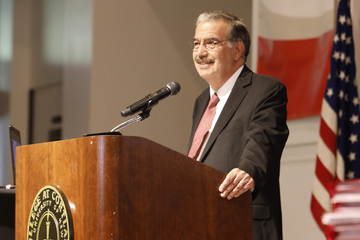
01/19/2023
SUNY Cortland President Erik J. Bitterbaum spends an hour every day walking the elevated track in the Student Life Center, talking with students and learning about their challenges. He shared that daily experience with faculty and staff during his State of the University Address Thursday, Jan. 19, while encouraging them to develop strong and meaningful connections with students.
The students’ concerns reflect the issues of mental health, career preparation and student retention, which pose significant challenges for higher education institutions, including SUNY Cortland, he said. A renewed bond and understanding between students and the university’s employees can help students better navigate their time on campus and find success in their lives after graduation.
“Unusual levels of student disconnection have been observed,” Bitterbaum said. “Nationally, faculty are reporting record numbers of students checked out, stressed out and unsure of their future. They’re disengaged.”
Bitterbaum cited an informal 2022 study by The Chronicle of Higher Education found faculty members across the country reporting increasing levels of disengagement among college students, who skip class, avoid participating in discussions and have trouble recalling what they’ve learned.
The causes of this lack of engagement in certain students come from a variety of sources, many of which are related to the pandemic, including struggles with online or hybrid learning, deaths in the family and financial insecurity.
The Healthy Minds Network, which has surveyed more than 500,000 students at 450 colleges and universities for 15 years, reports that rates of depression and anxiety have risen 19% and 17%, respectively, between 2013 and 2022.
Bitterbaum asked faculty and staff to consider adopting new strategies to support students both in their academics and in their lives outside of class. Some ways to assist students with their mental health may include reaching out more frequently, spending more time on community-building exercises and group discussions, replacing high-stakes tests and papers with smaller and more frequent assignments and maintaining flexible deadlines and giving students input on creating assignments of interest to them.
“I’m not saying you have to do these things, but I think it’s really worthy of a conversation,” Bitterbaum said.
In addition to the university’s Counseling and Wellness Services, faculty and staff may point students toward Togetherall, a free, 24/7 online support community that includes professional and peer-driven resources.
Students who have shared their concerns directly with Bitterbaum ask mainly for simple gestures of support from faculty.
“These are very sincere students and this is what they’re sharing,” Bitterbaum said. “Could you give students a voice in your class? Show students that you care? Check-in emails to ask if students are OK?
“I know this is a lot of work, but empathy goes a long way with this generation.”
Career Services was highlighted in the address as a crucial tool for students looking for employment after graduation. Prospective parents are increasingly asking about the office’s effectiveness in preparing students for the job market.
Data from the National Association of Colleges and Employers (NACE) show that students who use at least one service from the office receive additional job offers and this increases for each additional service students use.
Bitterbaum recommended faculty and staff point students, even first-year students, to Career Services as part of creating more confident and goal-oriented students.
On a brighter note, Bitterbaum noted a robust number of applications to the university for the 2023-24 academic year. Through mid-November, SUNY Cortland had received 11,400 applications, an increase of 125.8% from the previous year. Cortland has received more applications than any other SUNY comprehensive university to date.
“We’re very lucky, Bitterbaum said. “We have the right majors, we’re in the right part of the state and we do a marvelous job of communicating who we are.”
Other noteworthy developments across campus include:
- All In: Building on Success, the university’s comprehensive campaign, recently concluded by raising more than $30 million.
- Installation of new and modern signage was completed across campus during the fall semester.
- Renovations to the Miller Building are nearing an end. The final steps of the design phase for the C wing of Van Hoesen Hall are in progress and work is set to begin in late May. Upcoming projects will include renovations to Corey Union and the A and B wings of Van Hoesen.
- SUNY Cortland is officially a university, with formal recognition coming from SUNY System Administration on Jan. 1, 2023.
- John B. King Jr. was named SUNY chancellor on Jan. 15. King was previously education commissioner for New York state and was the U.S. Secretary of Education from 2016 to 2017.
- Cortland now offers seven fully online graduate degree programs: history; literacy education; sport management; physical education leadership; second language education in TESOL, a master’s in therapeutic recreation and a certificate program in therapeutic recreation.
- Students are doing important experiential learning abroad. Associate Professor Kenneth Cohen traveled to Hawaii with a group of students to study ecotourism last year. The baseball team was in the Dominican Republic this past week, doing youth clinics and service learning.
The president’s State of the University Address was followed by a discussion on the university’s strengths and opportunities to inform strategic planning presented by the Institutional Planning and Assessment Committee.
A recording of the State of the University Address will be posted online at a later date.